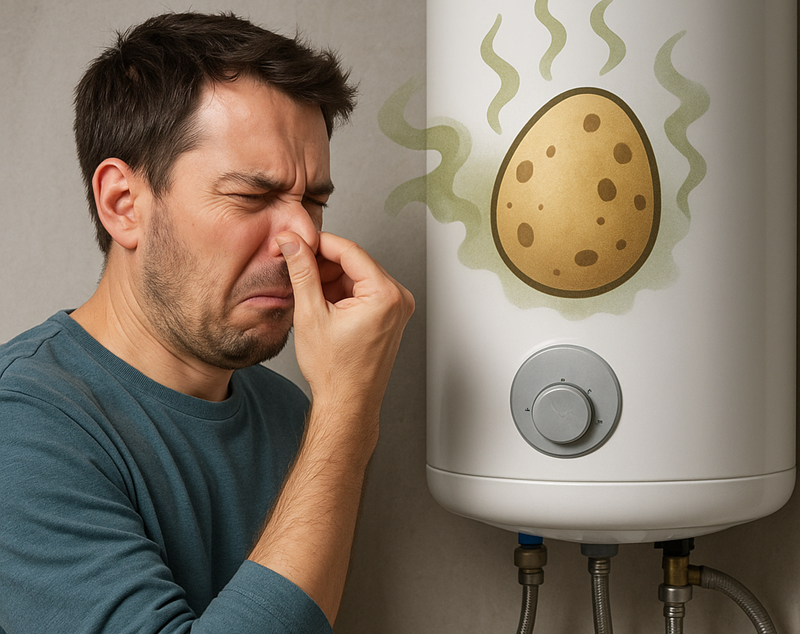No one wants to turn on the hot water and be hit with the foul odor of rotten eggs. That sulfur-like stench is more than just unpleasant — it signals a serious issue with your water heater. In most cases, this smell in water heater systems is caused by a chemical reaction between sulfur, bacteria, and the anode rod inside the tank.
Addressing the issue early can prevent bigger problems like water contamination, costly repairs, or complete heater failure. A licensed plumber in Littleton CO, can pinpoint the root cause and apply the right fix before the damage spreads. Whether you’re dealing with mild or strong odors, these proven solutions can help restore your hot water to its fresh, odor-free state.
So, what exactly causes that unpleasant smell in your hot water—and how do you get rid of it for good? Let’s break it down.

1. Flush the Tank to Remove Bacteria and Sediment
The most common reason for a rotten egg smell in water heater tanks is the presence of sulfate-reducing bacteria. These bacteria thrive in warm, stagnant environments and interact with the anode rod to produce hydrogen sulfide gas — the source of the bad smell.
To fix this, flush your tank thoroughly. Drain all the water from the heater and rinse out any sediment or bacterial buildup. Use a garden hose to clear the bottom of the tank where sediment collects. If you’re unsure how to do this properly, call a professional plumber in Littleton CO to handle the task safely and efficiently.
2. Replace the Magnesium Anode Rod
A magnesium anode rod is designed to protect your water heater by corroding itself instead of the tank. However, it also interacts with sulfur in the water and the sulfate bacteria, intensifying the smell in water heater tanks.
Switching the magnesium rod to an aluminum-zinc alloy rod can drastically reduce or eliminate the odor. These rods are less reactive and don’t promote the same hydrogen sulfide production. This simple replacement can make a major difference in your water quality.
3. Disinfect the Tank With Hydrogen Peroxide
Hydrogen peroxide is a safe and effective solution for killing bacteria in water heaters. Unlike bleach, it doesn’t leave behind harsh chemical residues or corrode your tank.
To apply it, turn off the water supply and power to the heater. Drain the tank and add one to two pints of 3% hydrogen peroxide per 40 gallons of capacity. Fill the tank with cold water, let it sit for at least two hours, then flush it again. This process sanitizes the interior and helps neutralize the smell in water heater systems.
4. Install a Powered Anode Rod
If you’re constantly battling that unpleasant rotten egg smell every time you run hot water, you’re not alone. That smell in water heater systems is typically caused by hydrogen sulfide gas, a byproduct of a chemical reaction between water minerals and the anode rod inside your water heater. It’s not just annoying — it’s a sign your system needs attention.
Although more expensive, powered anode rods are a long-term solution. They are especially effective in homes with naturally high sulfur or iron content in their water supply. A skilled plumber in Littleton, CO, can help you install the right type for your system. Hire certified water heater repair experts to ensure proper installation and lasting results.
5. Increase the Water Temperature Temporarily
Bacteria responsible for the rotten egg smell in water heater tanks cannot survive at high temperatures. Temporarily increasing the temperature to 140°F or above for several hours can help kill the bacteria inside.
However, take extra caution when doing this. High temperatures increase the risk of scalding. If you’re trying to eliminate a smell in water heater systems, temporarily raising the temperature can help kill odor-causing bacteria. After heating, flush the tank thoroughly to remove dead bacteria and built-up sediment. For safety, always lower the temperature back to 120°F once the process is complete.
6. Treat Your Home’s Water Supply
Sometimes, the root of the problem lies in your water source. Well water, in particular, is more likely to contain sulfur and bacteria that contribute to odor. Installing a whole-home water filtration system or a water softener can help treat the issue before it reaches your heater.
Iron filters or sulfur removal systems use oxidation or aeration to remove hydrogen sulfide, eliminating the smell at the source. A qualified Littleton Colorado plumber can test your water and recommend the right filtration setup.

7. Call a Professional for a Complete Inspection
If you’ve tried multiple fixes and the smell in the water heater persists, it’s time to bring in a professional. A licensed plumber can perform a complete diagnostic check to identify underlying issues such as damaged components, improperly sized anode rods, or contaminated water lines.
A trained expert will also ensure that the heater is functioning safely and efficiently. Leaving unresolved odor issues for too long can lead to tank corrosion or health risks due to bacterial contamination.
Say Goodbye to the Rotten Egg Smell — Take Action Today
There’s no reason to tolerate that unpleasant rotten egg smell in water heater systems. From flushing the tank and replacing the anode rod to treating your entire water supply, effective solutions are available for every situation.
Ignoring the issue can lead to persistent odors, reduced water quality, and even long-term damage to your plumbing system. Take proactive steps now to eliminate the smell in water heater units and improve both performance and lifespan.
If you need help resolving the issue or want expert advice, contact A Clear Choice Plumbing and Heating. Their team of certified professionals is ready to eliminate odor issues, replace faulty components, and ensure your home’s hot water is safe and fresh. Don’t wait for the problem to worsen — call today for trusted service from an experienced plumber in Littleton CO.
FAQs About the Smell in Water Heater
- Q1. Why does water heater smell like rotten eggs?
The rotten egg smell in water heaters typically forms when naturally occurring bacteria interact with the tank’s anode rod, leading to the release of hydrogen sulfide gas. - Q2. Will flushing the water heater remove the smell?
Yes, flushing helps remove bacteria and sediment that contribute to the odor. - Q3. Which anode rod helps reduce the smell in water heater?
An aluminum-zinc anode rod is more resistant to odor-causing reactions than magnesium rods. - Q4. Is the smell in water heater dangerous?
While not usually harmful, the smell can indicate bacteria or chemical reactions that need attention to avoid water quality issues. - Q5. Can I use bleach to clean the tank?
Bleach is effective but can be harsh. Hydrogen peroxide is a safer and gentler alternative. - Q6. How often should I flush my water heater?
Flushing once every 6 to 12 months is recommended, especially in areas with hard water or odor problems. - Q7. Should I call a plumber in Littleton CO if the smell doesn’t go away?
Yes, if simple fixes don’t work, a licensed plumber can inspect and solve the issue professionally.
